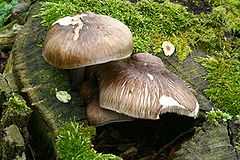Pluteaceae
| Pluteaceae | |
|---|---|
 | |
| Pluteus cervinus | |
| Scientific classification | |
| Kingdom: | Fungi |
| Division: | Basidiomycota |
| Class: | Agaricomycetes |
| Order: | Agaricales |
| Family: | Pluteaceae Kotl. & Pouzar (1972) |
| Type genus | |
| Pluteus Fr. (1836) | |
| Genera | |
The Pluteaceae are a family of small to medium-sized mushrooms which have free gill attachment and pink spores. Members of Pluteaceae can be mistaken for members of Entolomataceae, but can be distinguished by the angled spores and attached gills of the Entolomataceae. The four genera in the Pluteaceae comprise the widely distributed Volvariella and Pluteus, the rare Chamaeota, and Volvopluteus, which was newly described in 2011 as a result of molecular analysis.[1] The Dictionary of the Fungi (10th edition, 2008) estimates there are 364 species in the family.[2]
Selected species
- Pluteus cervinus, synonym Pluteus atricapillus, or deer mushroom
- Pluteus concentricus
- Pluteus leoninus
- Pluteus murinus
- Pluteus salicinus, or the knackers crumpet (hallucinogenic)
- Volvariella volvacea
- Volvopluteus gloiocephalus
See also
References
- ↑ Justo, A.; Vizzini A.; Minnis A.M.; Menolli Jr., N.; Capelari, M.; Rodríguez, O.; Malysheva, E.; Contu, M.; Ghignone, S; Hibbett, D.S. (2011). "Phylogeny of the Pluteaceae (Agaricales, Basidiomycota): Taxonomy and character evolution". Fungal Biology 115 (1): 1–20. doi:10.1016/j.funbio.2010.09.012. PMID 21215950.
- ↑ Kirk PM, Cannon PF, Minter DW, Stalpers JA. (2008). Dictionary of the Fungi (10th ed.). Wallingford, UK: CABI. p. 550. ISBN 978-0-85199-826-8.